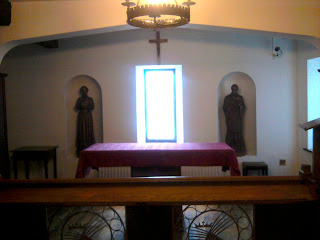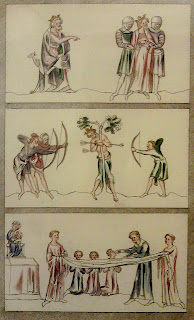In 24 hours, I shall probably be on my way back to Oscott, a day before the start of third year!
Where has all the time gone?
Term begins on Wednesday, with the arrival of all the new students, both those who were formerly students of St Cuthbert's, Ushaw, as well as the first year, many, but by no means all, of whom are joining us from St Alban's, Valladolid. With all these new students, I think the house will number around 56, up from 26 last year (including part-time). The house-list on the website hasn't been updated yet, so I don't know who most of these people are, but then my curiosity will be satisfied in a few days.
Last year, we said 'goodbye' to our three brethren from the Society of the Sacred Heart of Jesus, who are now all ordained and at home in India, but this year, we say 'hello' to three new brethren from the Order of St Augustine, who will be studying philosophy at Oscott.
The Friars Hermits, as they were once called, have a house in Harbourne in Birmingham, which is on the opposite side of the city, near Edgbaston. They are also not strangers to our diocese of East Anglia. The Austin Friars still have a house in Clare in Suffolk, and have pastoral responsibility for that parish. Putting my history-hat on, the Order, both the canons and friars, had several houses in East Anglia before the Protestant Reformation, including Walsingham Priory.
We are also joined by an additional brother from the Society of Divine Vocations, who have made their mark on the Oscott community in the past few years! Two of their existing students are undertaking their extended placement this term, so will not be joining us at college for a few months.
Maybe there are more religious students I have not heard about yet. Not to mention the all the secular students, who are still in the majority!
East Anglia has no new students this year, but there are a number of applications this year, so keep these aspirants in your prayers over this year during their application process.
And please don't stop praying for vocations to the priesthood!
It is really great news that Oscott has a larger first year than we have seen for a while, and that the propaedeutic seminary in Valladolid is over-subscribed again, and English students will even being going to seminary in Ars this academic year.
It has been a year since the Papal visit, so we are only just seeing the first fruits of that visit in aspirants who are coming forward today. With prayer and a firm conviction, let us all do our part in building a culture of vocations in our parishes, making spiritual sacrifices, and supporting young men who you think may be suitable. Nurture the faith of young people with orthodox Catholicism. Support your parish prayer groups, social groups and youth clubs, and attend exposition of the Blessed Sacrament.
The People of God must consent to the ordination of a priest at his ordination, so the People of God must do their part in helping them from the start. It might seem silly, but don't overestimate the power of the question, "have you ever thought of being a priest?"
 The East Anglia Seminarians' blog is now available on your phone. The mobile web version should load automatically on your mobile or smartphone instead of the normal web version.
The East Anglia Seminarians' blog is now available on your phone. The mobile web version should load automatically on your mobile or smartphone instead of the normal web version.













